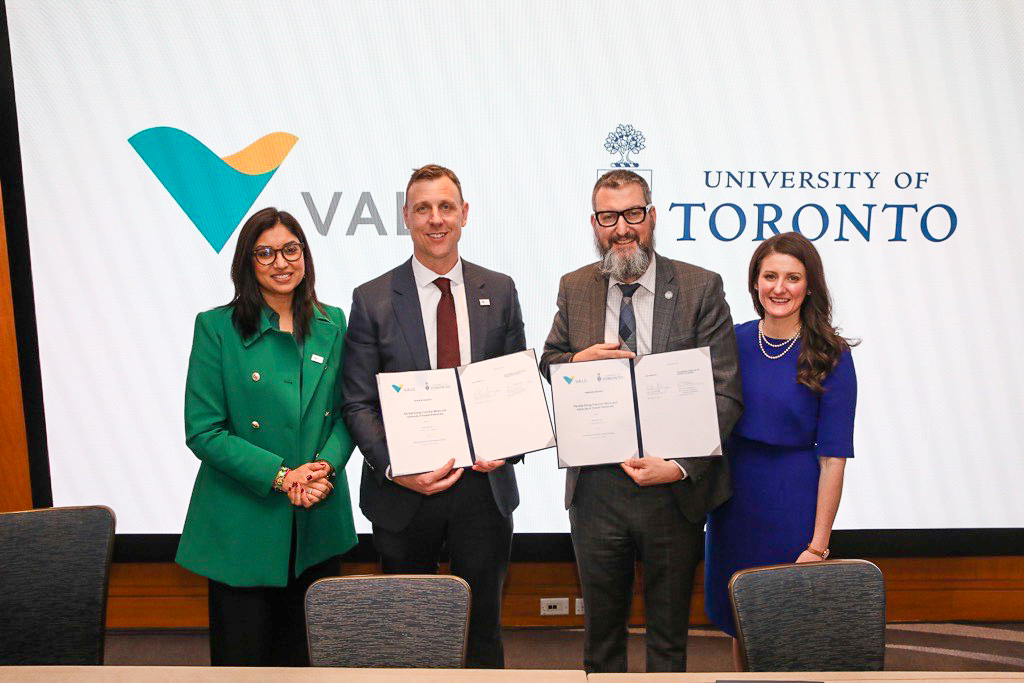A new partnership between the University of Toronto and Vale Energy Transition Metals will strengthen Canada’s position in the critical minerals sector by developing sustainable mining solutions, as well as fostering Canadian skills and talent.
The framework agreement was signed March 7, 2023, at the Prospectors & Developers Association of Canada (PDAC) 2023 Convention, held in Toronto. The partnership launches with an initial $1.6 million investment over the next three years and will include several multidisciplinary projects led by experts from both institutions.
“As our economy continues its transition toward carbon-free sources of energy, the supply of critical minerals — such as nickel and cobalt, among many others — will only become more important,” says Leah Cowen, Vice-President, Research & Innovation, & Strategic Initiatives at the University of Toronto.
“Through this new partnership, we are keeping Canada at the forefront of innovation, and further strengthening our position as a trusted global supplier of sustainably-sourced critical minerals.”
Last year, the Government of Canada launched the Canadian Critical Minerals Strategy, which aims to increase the supply of responsibly sourced critical minerals and support the development of domestic and global value chains for the green and digital economy. The new partnership is a flagship example of how those aims can be realized.
“U of T has a long track record of excellence in mining and mineral processing technology, which has been foundational for developing new tools and technologies across the industry,” says Alex Mihailidis (BME, Medicine), Associate Vice-President for International Partnerships at the University of Toronto.
“Today, we are not only supporting Vale’s ambitions to be leaders in the critical minerals space but also strengthening Canada’s position as global sustainability leaders in key sectors like electric vehicles, power generation and energy storage. Canadian innovation is enhancing our capabilities across this entire value chain, and materials are a vital link.”
One of the first projects to be funded under the partnership will look at new ways of processing low-grade nickel-containing ultramafic ores.
These ores are plentiful in Canada, including in the area of Thompson, Manitoba, where Vale has significant operations. They represent a major potential new source of nickel, a critical component of lithium-ion batteries, but are difficult to process with existing techniques.
“These ores have a very high magnesium content, which interferes with the operation of conventional mineral processing and smelting techniques,” says Professor Mansoor Barati (MSE).
“In partnership with Vale Energy Transition Metals, my group plans to develop an alternative route for nickel recovery which does not require high temperature smelting. This addresses the challenge posed by the magnesium, but it also lowers the overall energy footprint of the process and could virtually eliminate sulphur dioxide emissions as well.”
Vale Energy Transition Metals, headquartered in Toronto, Canada, is one of the world’s largest producers of responsibly sourced nickel, copper, cobalt and platinum group metals. In Canada, the U.K., Brazil, Japan and Indonesia, Vale produces critical minerals that power electric vehicles, create renewable energy solutions and help develop life-saving medical equipment.
“This multiyear, strategic partnership is an important catalyst to accelerate and expand our portfolio of decarbonization efforts and circular mining knowledge,” says Deshnee Naidoo, Executive Vice President of Vale Energy Transition Metals.
“For Vale, it means working in close co-operation with leading minds and researchers across a global network to drive innovation, expand the skills of our people and provide new ways to link to the communities where we operate.”
The partnership will extend beyond research to include experiential learning opportunities for undergraduate and graduate students.
“Canada is poised to be a leader in the clean energy transition; we have the capacity and the ambition,” says Rachel Wallace, Associate Director, Strategy & Business Development.
“This partnership is a first-of-its kind for the industry producing new technologies, novel knowledge discovery and a built-in pipeline to bring those insights to market. Most importantly for young people and Canada, it will create high-value, future-ready career paths, helping us foster a new generation of world-class talent.”




